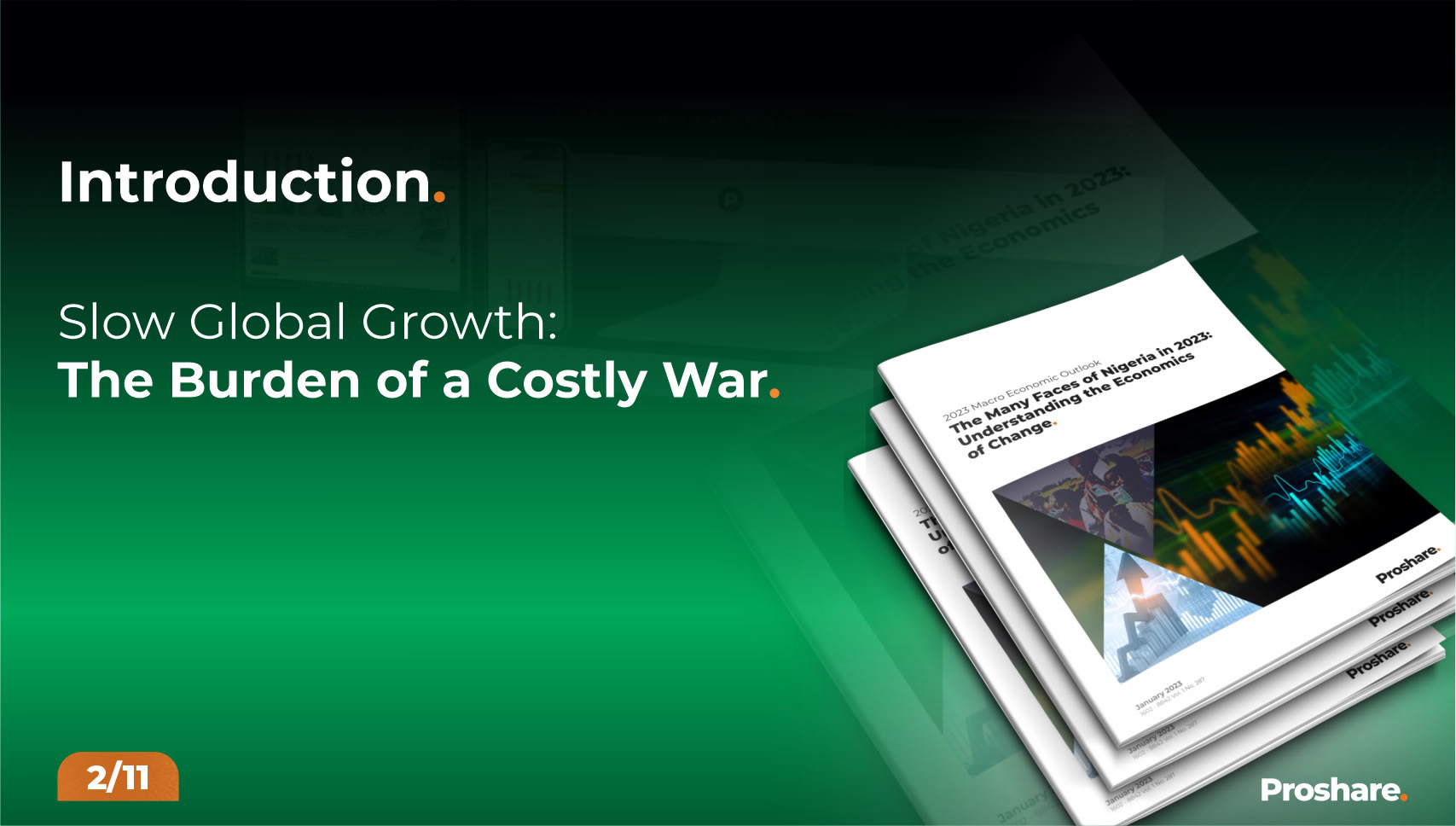Download the Full PDF Reports Here:
- The Many Faces of Nigeria in 2023: Understanding the Economics of Change
- Report Summary: 2023 Macro Economic Outlook - The Many Faces of Nigeria in 2023: Understanding the Economics of Change
2023 will be a year of opportunities wrapped in a gift box of uncertainties. The global markets will be marred by what International Monetary Fund (IMF), President Kristalina Georgieva, called ‘fragmentation’. She pointed out that the world was settling into several blocks of relationships, thereby limiting trade, and restricting the movement of people and capital, a phenomenon the Director of the World Trade Office (WTO), Dr. Ngozi Okonjo-Iweala, considered detrimental to global trade health.
The global supply chain bottlenecks will lead to higher prices and significant hikes in manufacturing costs, which would result in a higher cost of living and a lower quality of life. In Africa, the blowback would be several times more devastating as higher energy costs, interest rates, and inflation pushes consumers and manufacturers down deeper holes.
African economies will see commodity prices rise as supply disruptions put upward pressure on commodity prices and the modest growth of the Chinese economy slowly increases input demands. How much the rise in commodity prices can help African nations grow will depend on their import reliance. The more dependent the country is on imports the less beneficial the rise in commodities prices. Higher commodity prices would lead to higher input and finished goods costs and for countries with high import bills, this could hurt trade balances.
In 2023 Nigeria will see high but gradually moderating inflation rates. Monetary tightening will continue, and interest rates will be high as the Central Bank of Nigeria (CBN) heads off inflation. The implication is that fixed-income instruments will see lower prices as yields climb in the short end of the market but fall at the longer end. The foreign exchange market will remain high as export revenues are not likely to grow fast enough to improve the exchange rate. Traders may find it useful to buy currency futures to hedge against the adverse effect of the naira decline on imported goods and services.
Portfolio investors can cherry-pick hidden value opportunities in the market as corporate fundamentals would be discounted by fears of weakening underlying corporate fundamentals. With the agriculture sector growing at 1.2% in 2022, investors may remain cold on equities within this sector. How strongly investor sentiments will be towards agriculture would depend on how well companies transmute from agriculture to agribusiness and agritech.
Technology will play a large part in the growth of the country in 2023 as artificial intelligence and machine learning (AI/ML) scales up industrial production and service delivery quality and experience. The sector would provide larger job opportunities for young Nigerians that choose to acquire technical skills as it would condemn those trapped in the obsolescence of the pre-web 3-economy to joblessness.
The entertainment sector will flourish in 2023 but most of the industry value would reside outside the Nigerian economy as artists wary of heavy income tax payments decide to keep their operations in low-tax enclaves abroad. With the threat of higher taxes looming in Nigeria, the fiscal authorities would inadvertently push most of the entertainment value chain outside the country, thereby worsening domestic unemployment and lower revenues from value added tax (VAT), corporate income tax (CIT), and personal income tax (PIT). The government’s tax policy will push the sector to the outer edges of what economists call the ‘Laffer Curve’, or that point where higher taxes result in lower incomes.
Beyond taxes, subsidies and concessions are expected to be removed in 2023, but in January the Federal Government approved a N1.9trn tax credit to the national oil company, the NNPC Limited, in addition to the earlier N621bn in 2022, bringing total road infrastructure tax credit (RITC) to N2.52trn. Taiwo Oyedele, a partner at PwC, notes that at a 30% tax rate, the assumption appears to be that the company would make a pre-tax profit of N8.4trn; the profit figure is not impossible but starkly improbable.
The performance of the Nigerian economy will be delicately balanced on creativity in raising public revenue beyond taxation and the progressive development of human capital and workplaces and spaces. It will also rest on the adoption and adaptation of technology to create tradable value. The thinking of tomorrow will start today, and policymakers have no time to experiment with indolence, after the 2023 elections the tyre rubbers must hit the tracks immediately.
 Lagos, NG • GMT +1
Lagos, NG • GMT +1











 376 views
376 views



























 Sponsored Ad
Sponsored Ad
 Advertise with Us
Advertise with Us









